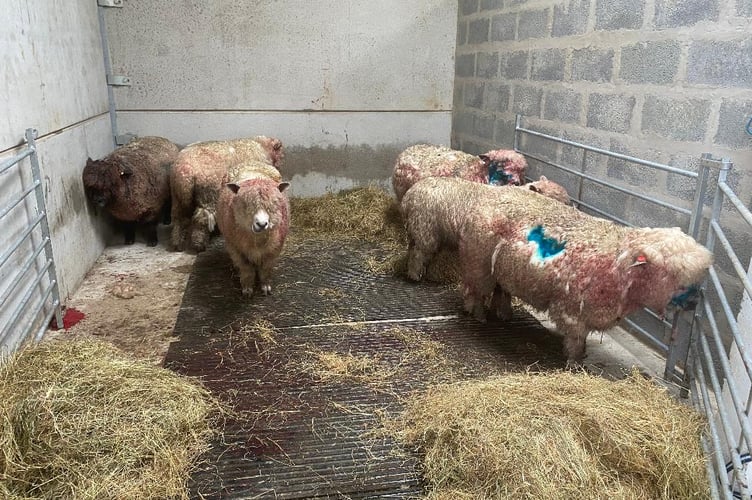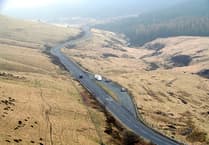FARMING unions and politicians are calling for tougher laws to tackle the issue of dog attacks on livestock.
The calls come a week after the Cambrian News reported that the owner of four dogs that killed 25 sheep received just a £75 for the attack that left farmers around £7,000 out of pocket and led one couple to decide not to breed their flock any more.
Evan Jones, 37, of Blaendyffryn, Creuddyn Bridge, the owner of four dogs, believed to be Alsatians, was ordered by magistrates in Aberystwyth to pay the fine and £85 in court costs as the owner of the dogs ‘worrying livestock’ at Berthela and Rhyd y Gof Uchaf.
Liz Nutting, a small holder, lost 10 ewes in the attack, with many more injured, with a neighbouring farmer losing 15 sheep.
She called the fine a ‘slap in the face’ adding: “It’s an insult to hardworking farmers.
“We are no longer breeding the flock as we feel we can’t start all over again and the dogs are still there
.“It could happen again. We still have anxiety.
“It’s changed the way we live here.”
Dyfed-Powys Police’ rural crime team said: “Livestock worrying is a criminal offence and comes under the Dogs (Protection of Livestock) Act 1953.
‘Worrying’ is where a dog attacks or chases livestock causing injury or suffering.
“This isn’t just a threat to a farmer or landowner’s livelihood, it’s also a dangerous situation for the animals involved, and could lead to more risk if the animals get onto the road.”

Rural Crime Officer, PC Jonathan Thomas, added: “As a predominantly rural force, we regularly receive reports of livestock worrying and it is an offence we take very seriously.
“Although farmers will quite often accept compensation from the dog owners, where the owner is identified, that doesn’t really take into account the ongoing costs to buy or breed replacements.
“We regularly put out messages on social media and in the press advising dog owners to keep their dogs on leads and to endure that their security at home is such that their dogs can’t escape.
“Although we try our best to educate dog owners, many still think it is ok to allow their dogs to roam freely in the countryside even when it’s obvious there are livestock in nearby fields. Private land is private land and unless it has ‘open access’ rights or a public right of way through it then people should not even be walking their dogs through fields, let alone leave them loose.
“We are here to support our rural communities and look to reduce such offences, where necessary bringing the offenders to justice. These cases have a huge impact on rural businesses and the confidence in the community”.
Mrs Nutting was complimentary of the support police had given her over the last 16 months whilst the case came to court, but is calling for a change in the law.
She welcomes The Dogs (Protection of Livestock) (Amendment) Bill.It applies to England and Wales and had its first reading in the House of Lords on 20 May 2024.
“I want to see that bill ratified by the Lords as a matter of urgency.
“Also, the farming community and the police given the support they deserve,” she said.

If the bill becomes an Act of Parliament, it will allow for offenders to be given an unlimited fine.
It will also give police greater powers to respond more effectively to the worrying or attacking of livestock by dogs.
Officers would be able to seize a dog or dogs they believe has been involved in an incident when the owner is not present, search properties and take samples and collect dental impressions.
No dogs were seized following the Creuddyn Bridge incident. Both farming unions are also supportive of a change to the law.
NFU Cymru Livestock Board Chairman, Rob Lewis, said: “Each and every time a dog attacks or worries livestock it is the farmer that pays the price, both financially and mentally.
“Farmers look after 80 per cent of the land area of Wales and many public footpaths cross through their land. This means it is vital that we establish measures to ensure that livestock, members of the public and their dogs are all kept safe. We want people to enjoy the countryside and see where their food is produced, but we ask for this to be done responsibly. Dogs should always be on a lead around livestock, only letting go of the lead if you feel threatened by cattle.
“All too often we see owners believing their dogs are under control, that they are docile and would not harm sheep or other animals, but they can cause distress, injury and death to livestock if they are not walked responsibly, particularly when that dog is not familiar with livestock.
“Sheep farming is more than a livelihood for farming families across Wales. We have a responsibility for the welfare of every animal we have on the farm. To see stock maimed and killed can be a very upsetting experience for us. It is something no farmer should have to go through.
“In our manifesto ahead of the General Election earlier this year we asked for a consistent and co-ordinated response to rural crime across police forces, including fair funding for rural policing, and a dedicated rural crime team in every police force area. We said we would like to see the law strengthened in this area with an increase in fines for owners whose dogs attack livestock, a clear requirement that dogs should be kept on a lead around livestock and increased powers for the police, including the power to obtain DNA samples from dogs believed to have attacked livestock.”
The Farmers Union of Wales says it has been fully and publicly supportive of increased powers for police forces in order to help officers respond more effectively when there has been a dog attack.
A recent innovation that could help tackle the issue is the Canine DNA Recovery Project Testing Kit. The FUW held a panel discussion regarding this project at this year’s Royal Welsh Show.
This project has been active since April 2022, and is funded by the Liverpool John Moores University.
It’s currently in its second phase of three, by supporting the recovery of canine DNA from livestock attacks through community engagement. The aim of the second phase is to increase the number of livestock attack samples submitted to the project, in order to develop the methods to support forensic analysis of canine DNA by UK labs.Moreover, the Dogs (Protection of Livestock) (Amendment) Bill was close to becoming legislation before the General Election was announced in May earlier this year. If the Bill is passed, it will strengthen the existing law which has been in place since 1953. It will help to prevent instances of dog attacks by making it easier to collect DNA samples and, in more serious cases, seize and detain dogs to reduce the risk of further incidents.
Dog attacks on livestock have a damaging impact on the mental health of livestock farmers.
Sharing personal experiences, FUW Regional Vice President Anwen Hughes and her family at Llanarth reported that they had experienced a number of incidents in recent years, where dogs were harassing and killing stock at their Bryn Gido sheep farm: “We have received great support from our local rural crime team and the FUW,” explains Anwen who farms in partnership with husband Rhodri.
“In our case, a warning was given to the irresponsible dog owner, but there are many cases where the owner cannot be identified and this is why greater police powers, including those relating to crime investigation, must be brought forward.
“It is difficult to unsee the horror left behind after dogs have attacked and disfigured sheep in a field. It impacts our own mental health and well-being, in addition to the cost implications it has on the business. It is a harrowing situation to be in."
Ceredigion Preseli MP Ben Lake has been instrumental in pushing forward the bill which aims to strengthen the law.
The Bill attempts to strengthen the existing law which dates from 1953 to prevent the instances of dog attacks on livestock by ensuring police have the powers to collect the necessary DNA and other forensic evidence to ensure investigations into such attacks are more effective, and convictions more likely. It also allows the police to intervene to prevent repeat attacks from dogs in the care of irresponsible owners.
Lake MP served as one of the members of the Bill Committee.
Mr Lake told the Cambrian News: "I have witnessed the devastation that livestock worrying has, not only on the animals involved, but also on the families that raise them.
“Dog attacks take a significant emotional toll on farmers and their families, as well as having a financial impact on their livelihoods. NFU Cymru estimates that farm animals worth an estimated £883,000 were severely injured or killed in Wales in 2023, more than double the 2022 cost of £439,000.
"The existing legislation dates from the 1950s, and is no longer effective in protecting livestock.
“A number of attempts have been made to reform the law in this regard, and most recently in the form of the The Dogs (Protection of Livestock) (Amendment) Bill which was introduced in December 2023.
“The Bill would have increased the powers of the police to gather evidence and improve enforcement.
“The Bill would have granted police the authority to take samples or impressions from a dog suspected of having attacked livestock, and to detain a dog for this purpose.
“Additionally, magistrates would have been empowered to issue warrants authorizing entry to search premises to retrieve this evidence.
“The Bill also sought to extend police powers to cover roads and paths, broaden its scope to include more types of livestock, and impose an unlimited fine on individuals convicted of worrying livestock offences.
“Despite the Bill making its way through the House of Commons and to the House of Lords for its first reading in May 2024, the announcement of the General Election and the dissolution of Parliament on the 30 May, meant that all unfinished parliamentary business fell.
“Given the importance of this Bill, it was disappointing to see that no mention was made of it in the new Government's legislative programme.
“However, as Parliament reconvenes, I am hoping to meet with the Minister of State at the Department for Environment, Food and Rural Affairs, Daniel Zeichner MP, to see whether the Government would support an attempt at reintroducing it as a Private Bill. I am hoping to do so as a matter of urgency because tighter legislation is the least that dedicated farming families deserve."
The Welsh Government in the meantime is working in partnership with pet charity Blue Cross and the police in Wales to tackle dog attacks on livestock.
September, a new course by the leading animal charity introduces a behaviour around livestock module to its existing responsible dog ownership course.
The course aims to educate owners and help reduce instances of dog attacks on livestock.
It will be made available to police across Wales for dog owners involved in a livestock attack.
The Cabinet Secretary for Climate Change and Rural Affairs, Huw Irranca-Davies, met with a farmer whose livestock was recently attacked by dogs: “Dog attacks on livestock is a significant and incredibly distressing issue and we want to assure farmers that we’re taking this issue seriously.
“Meeting with someone who has been a victim of this type of crime has given me the opportunity to discuss the issue in some depth directly with the communities affected.
“We take these attacks very seriously and we want people to take responsibility for their pet’s behaviour whether they live or walk near farmlands.”
Adapting and implementing the course has been championed by Rob Taylor, Wales’ Wildlife and Rural Crime Coordinator.
The post aims to strengthen the response to Wildlife and Rural Crime across the country and funding has been secured to extend the contract for a further four years.
Rob Taylor said: “As the UK Police lead for preventing livestock attacks by dogs, I see far too often the devastating impact, not only to the animals, but the farmer and the dog owners alike, both financially and emotionally.
“This is a difficult problem to tackle but as well as much needed law changes, we see an awareness course to educate irresponsible dog owners as vital to moving forward and reducing the number of offences.
“I also welcome the extension of the rural coordinator post here in Wales, enabling me to build on the strong foundations and proactivity we have already seen with our partners, through the Wales Wildlife and Rural Crime Strategy."





Comments
This article has no comments yet. Be the first to leave a comment.